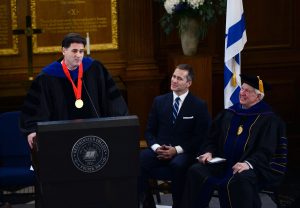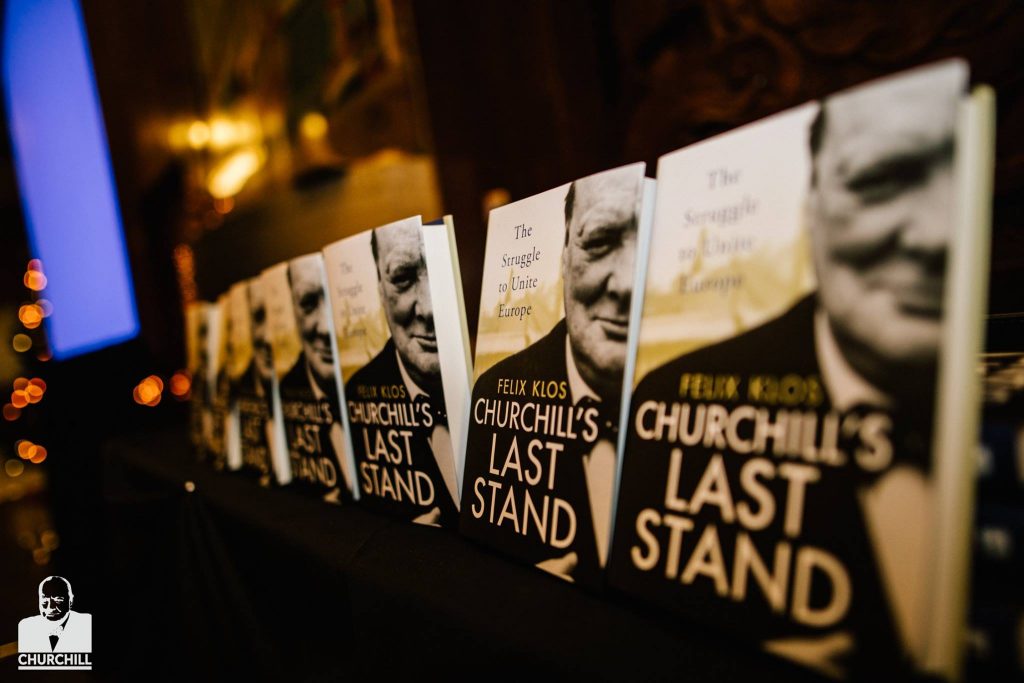
Bulletin #118 – Apr 2018
Churchill and Europe

April 15, 2018
Felix Klos, Churchill’s Last Stand: The Struggle to Unite Europe, I. B. Tauris, 2017, 288 pages, $35. ISBN 978–1784538132
Review by ROBERT COURTS MP
Before the 2016 referendum, both “Leave” and “Remain” sought to win Winston Churchill to their cause. Leavers relied on the famous Saturday Evening Post article from 1930: “We have our own dream and our own task. We are with Europe, but not of it. We are linked, but not comprised. We are interested and associated, but not absorbed.” Remainers reject this, arguing that Churchill’s views changed over the following fifteen years. They focus instead on the speeches from Zurich onwards during the late 1940s. Just before the 2016 referendum, the publisher of this book by Felix Klos released a shortened version dealing only with those “European Movement” days and badged it “the must read book of the referendum.” Published more than a year later, this full-length edition is engaging, well written, and well researched. Klos shows that both sides take too simplistic a view, whilst revealing Churchill’s thinking on “Europe” in more detail than ever before—but perhaps not quite in the way the author intends.
As anyone will know who is familiar with the notorious internet story about Churchill advocating the use of “poison gas”—fake news if ever there were any—Churchill’s talent for producing striking but loose phrases is a real problem for the historian. Klos makes quite clear, when Churchill spoke of a “United Europe,” his meaning was not as plain as his language. When trying to understand the model that Churchill wished to create, readers would do better drawing an analogy with the “United Nations” than the “United States.”
Churchill certainly set a hare running in his 1946 call for Europe to unite and was used as a figurehead by others thereafter. He did argue for European integration, but that does not necessarily mean that he would have approved of this European Union, or wish Britain to be a part of it. His meaning always remained opaque about how, in what ways, and how far such “unity” should progress. Klos points out that from the start there were two integrationist camps: the “radical federalists,” who wanted immediate, rigid, constitutional federalism imposed from the top down, and the “pragmatists” who favoured slower, limited integration, flowing from the peoples of Europe, where reconciliation preceded integration, and which might or might not evolve into a federal union.
This distinction has been almost entirely forgotten in the contemporary debate, as has the fact that Churchill, along with almost the entirety of the British political establishment then and a majority now, was squarely in the latter camp: favouring a looser arrangement of nation states co-operating freely, rather than being forced together by rigid structures: a kind of economic NATO, perhaps based around the OEEC. Klos makes this entirely clear, quoting Churchill telling Eden “Nothing will induce me to be a federalist.” In answer to a Labour question in the House of Commons in 1950 querying whether the Conservative party would ever be in favour of a federal union, Churchill answered that although he worked with the federalists in the European movement, the party was “not committed to their conclusions” and that Britain could not accept “full membership of a federal system of Europe” because of its ties to the Commonwealth and America. Two years later, and once again prime minister, Churchill returned to his 1930 language: “We are not members of the European Defence Community, nor do we intend to be merged in a Federal European system. We feel we have a special relationship to both. This can be expressed by prepositions, by the preposition ‘with’ but not ‘of’—we are with them, but not of them.”

2024 International Churchill Conference
Klos is entirely clear, therefore, that Churchill did not want Britain to be part of a federal Europe, but one of a looser nature. This explains why, when Churchill returned to power, he did nothing to advance what was by then a federalist cause, stating in a written minute in response to the Schuman plan in 1951: “Our attitude towards further economic developments on the Schuman lines resembles that which we adopt about the European Army. We help, we dedicate, we play a part, but we are not merged with and do not forfeit our insular or Commonwealth character…It is only when plans for uniting Europe take a federal form that we ourselves cannot take part, because we cannot subordinate ourselves or the control of British policy to federal authorities.”
This was more, however, than the methodological difference that Klos imagines. It was a philosophically different idea of where European integration should go, and one in which Churchill was very vague. Indeed, as Churchill himself told Duncan Sandys: “we are growing a living plant,” and it is probable that he did not spell out what he meant by “unity,” because he did not know himself. Indeed, some of Churchill’s pronouncements show that he had not thought through his own proposals, telling an audience “For Britain to enter a European Union from which the Empire and Commonwealth would be excluded would not only be impossible but would, in the eyes of Europe, enormously reduce the value of our participation.” Of course, that is precisely what happened, and precisely what would always happen within a customs union that could logically only contain a geographically European state. Proponents of Churchill’s supposed federalism ignore his failure to address the logical consequences of some of his proposals where they collided with his long-held, central beliefs, but simply give him the benefit of the doubt—in a federalist direction.
In any event, the “pragmatist” side lost. The French, frustrated at the slow progress under Churchill’s beloved Council of Europe (which, it should be noted, still exists and from which Britain is not withdrawing), produced the federalist Schuman plan in 1950. Attlee’s Labour government decided not to accept the invitation to take part in the discussions. And so the crucial chance to shape the destiny of postwar Europe—in a British, non-federalist direction—was lost. Thereafter, there was only ever one show in town: one that Churchill had not desired, in which Britain was never comfortable, and, after forty years of ambivalence, has now decided to leave.
Whether Churchill—who has been dead more than fifty years—would agree with this decision is impossible to say, and we should not try. But what is clear is that the European Union that now exists is not the one that Churchill dreamt of, being more federal, more bureaucratic and less democratic. That must be read alongside the other changed facts that Britain’s Empire is gone and its Commonwealth looser. It is difficult to avoid the conclusion, having read Klos’s book, that if Churchill had been listened to whilst in opposition, then we might have a very different European Union, one Britain was comfortable in and may not be leaving. For better or worse, Churchill was in opposition at the crucial time, and, by the time he was back in power, the course had essentially been set.
If modern day federalists wish to claim Churchill for their cause, Klos’s careful, fair, and scrupulous book will not assist them. History can help us understand Churchill’s views on his own times, and there are principles to be gleaned to guide us today. That is the role of history. But the decisions we make today are ones for us, not Churchill.
Robert Courts is Member of Parliament for Witney.
Subscribe
WANT MORE?
Get the Churchill Bulletin delivered to your inbox once a month.




